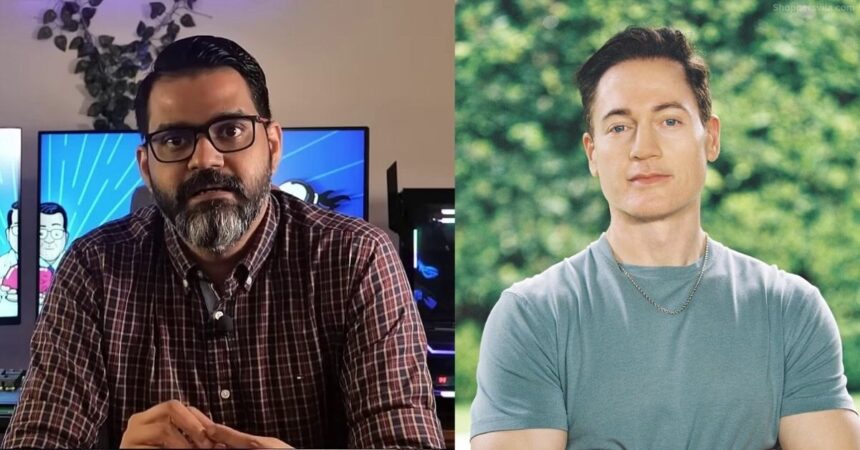In a recent public dispute, tech entrepreneur Bryan Johnson’s multi-million-dollar anti-aging venture “Blueprint” has come under intense scrutiny from medical professionals. Is this elaborate longevity program based on legitimate science, or is it the latest high-tech health scam? Kerala-based physician Dr. Cyriac Abby Philips, known online as “The Liver Doc,” has publicly challenged Johnson’s scientific claims, comparing his enterprise to notorious health scams of the past. This article examines the controversy surrounding Johnson’s longevity program and the critical questions being raised about his supplements and health claims.
The Man Behind Blueprint: Visionary or Modern Snake Oil Salesman?
Bryan Johnson, a tech millionaire, has gained significant attention for his ambitious “Project Blueprint” — a comprehensive anti-aging regimen on which he reportedly spends over $2 million annually. This elaborate health protocol includes:
- A strict vegan diet
- Rigorous exercise routines
- Consumption of numerous supplements
- Data-driven approach to longevity
Johnson has marketed himself as a pioneer in the quest to reverse aging, launching a line of health products under the “Blueprint” brand that promises to help others achieve similar results. His most notable offering is the “Blueprint Longevity Mix,” a supplement blend Johnson claims promotes better sleep, reduces stress, and boosts energy levels.
The Medical Challenge: Is Bryan Johnson’s Blueprint Just High-Tech “Snake Oil”?
Dr. Cyriac Abby Philips, who has established credentials as a clinical doctor and researcher specializing in liver diseases, has publicly accused Johnson of selling “potentially dangerous snake oil supplements.” In a detailed critique posted on social media, Dr. Philips wrote: “It is terrifying that people do not see Bryan Johnson as actually a well-evolved masculine form of fraudsters Elizabeth Holmes and Belle Gibson, selling both expensive and utterly useless investigations and peddling potentially dangerous snake oil supplements in the name of BLUEPRINT.”
The comparison to Elizabeth Holmes (founder of Theranos who was convicted of fraud) and Belle Gibson (who falsely claimed to have cured cancer through alternative therapies) represents a serious allegation against Johnson’s scientific credibility and business ethics.
Johnson’s initial response was dismissive, asking “Cyriac, why are you so angry? Who hurt you?” He defended his products by claiming that Blueprint offers “extra virgin olive oil, proteins, nuts, and nutrients which have independent and robust scientific evidence,” adding that they are “third-party tested” with “publicly available” certificates of analysis and are “affordably priced.”
Red Flags in Blueprint’s Scientific Claims
Dr. Philips has identified several scientific issues with Johnson’s Blueprint products that raise serious questions about their validity:
1. Lack of Dosage Studies
A fundamental scientific concern involves the lack of evidence for how Johnson determined the dosages for his supplements. Dr. Philips specifically asked: “Where are the dose-finding studies? Where is the efficacy and safety studies for these multiple supplements featuring multiple botanicals?”
This question gets at the heart of pharmaceutical research — before recommending specific dosages, there should be studies determining both safety and efficacy at various concentration levels.
2. No Evidence of Longevity Effects
Despite the name “Longevity Mix” and implied claims about extending lifespan, Dr. Philips points out that Johnson has provided no scientific evidence that his products actually increase longevity. He asked: “Where is the proof that this mix actually increases life expectancy/longevity? Is there a preclinical study in mice or primates or pigs?”
The lack of even preliminary animal studies supporting longevity claims raises questions about the scientific basis for Johnson’s products.
3. Potential Safety Concerns with Specific Ingredients
Dr. Philips raised specific concerns about ingredients in Johnson’s supplements:
Ashwagandha: Dr. Philips cited his own published research showing that Ashwagandha can cause “severe liver toxicity and is not for everyone.” He questioned how Johnson determined this ingredient was safe for widespread use without proper studies.
Rhodiola: According to Dr. Philips, this herb can cause side effects including “dizziness, dry mouth, excessive saliva” and may “worsen autoimmune conditions.” He referenced reports of herb-herb interactions potentially resulting in liver injury.
Red Yeast Rice: Dr. Philips noted that this ingredient contains compounds chemically similar to statins (monacolin K) and may contain citrinin, potentially causing “muscle, kidney, and liver damage in consumers.” He questioned whether Johnson’s product had been tested for these compounds.
4. Marketing Claims vs. Scientific Evidence
The Blueprint website makes claims about its Longevity Mix containing “13 health actives” including “CaAKG, Creatine Monohydrate, Glycine, L-Theanine, reduced Glutathione, Calcium, and Magnesium.” It also claims the mix promotes “stress relief, deeper sleep, enhanced muscle recovery, increased focus, and overall well-being.”
Dr. Philips has challenged Johnson to provide clinical evidence supporting these specific claims, suggesting that they may be marketing language rather than scientifically-validated benefits.
Bryan Johnson’s Blueprint: Revolutionary Science or Elaborate Scam?
Based on the public exchange between Dr. Philips and Bryan Johnson, several factors suggest Blueprint’s scientific foundations may be questionable:
1. Unanswered Scientific Questions
When Dr. Philips asked specific scientific questions about dosing studies, efficacy evidence, and safety research, Johnson did not provide direct answers. Instead, his response focused on the general claim that his products are “backed by strong scientific evidence” without providing citations or specific studies.
2. Third-Party Testing vs. Clinical Evidence
Johnson emphasized that Blueprint products are “third-party tested” with “certificates of analysis,” but this testing typically verifies only that products contain what they claim to contain — not whether those ingredients actually deliver the promised benefits at the specified dosages.
3. Potential Safety Concerns
Dr. Philips raised specific concerns about certain ingredients in Blueprint products that have known potential side effects or safety issues for some individuals. Without proper clinical studies addressing these concerns, consumers may be taking unknown risks.
4. Scientific Consensus
The broader scientific community has not validated many anti-aging interventions that claim to significantly extend lifespan. While certain lifestyle factors (diet, exercise, sleep) have strong evidence supporting health benefits, specific supplement regimens making longevity claims generally lack robust scientific support.
How to Evaluate Longevity and Health Supplement Claims
As consumers increasingly seek products to enhance health and potentially extend lifespan, it’s important to develop critical thinking skills when evaluating such claims. Here are key considerations:
1. Look for Peer-Reviewed Research
Legitimate health products should be backed by studies published in reputable scientific journals that have undergone peer review. These studies should specifically test the product in question or its exact formulation.
2. Check for Clinical Trials
The gold standard for proving effectiveness is randomized controlled trials in humans. For longevity claims specifically, look for evidence of health biomarkers that have been scientifically linked to longevity.
3. Verify Credentials
Evaluate the qualifications of those making health claims. Those with relevant medical or scientific credentials (MD, PhD in relevant fields) may have more credibility than those without specialized training.
4. Be Wary of Testimonials
Personal success stories, while compelling, do not constitute scientific evidence. A single person’s experience cannot account for placebo effects or individual variations.
5. Look for Transparency
Reputable companies disclose exact ingredient amounts, potential side effects, and contraindications. They should also be willing to share the research supporting their claims when asked.
Frequently Asked Questions
1. Is Bryan Johnson’s Blueprint program a sophisticated scam or scientifically proven?
While Johnson claims his products are backed by science, medical professionals like Dr. Philips have challenged him to provide specific clinical evidence supporting his claims about dosages, efficacy, and safety. Has Johnson been able to produce the scientific evidence requested? Thus far, he has not publicly shared peer-reviewed studies specifically testing his supplement formulations for their claimed benefits. Does this suggest his program lacks scientific validity despite its hefty price tag?
2. Are the ingredients in Blueprint supplements safe?
Some ingredients in Blueprint products, such as Ashwagandha, Rhodiola, and Red Yeast Rice, have documented potential side effects and safety concerns for certain individuals. Without proper clinical safety studies on the specific formulations, it’s difficult to determine their safety profile for all consumers.
3. How much does Blueprint cost compared to similar products?
Johnson claims his products are “affordably priced,” but critics like Dr. Philips have suggested they are “expensive” relative to their ingredients. The Blueprint Longevity Mix and other supplements represent a significant investment for consumers following Johnson’s complete protocol.
4. What credentials does Bryan Johnson have in medicine or health science?
Bryan Johnson is a tech entrepreneur and investor, not a medical doctor or scientific researcher. His background is primarily in business and technology, not in medicine, biology, or longevity research.
5. Are there alternatives to Blueprint with stronger scientific support?
Basic health practices supported by extensive research include regular physical activity, balanced nutrition, adequate sleep, stress management, and social connection. For specific health concerns, consulting with qualified healthcare providers who can recommend evidence-based interventions is more likely to yield reliable results than following marketed supplement regimens.
Conclusion: Are Consumers Being Scammed in the Age of Longevity Marketing?
The heated dispute between Bryan Johnson and Dr. Cyriac Abby Philips raises an uncomfortable question: Are consumers being scammed by pseudo-scientific longevity products? This controversy highlights a broader issue in the rapidly growing anti-aging marketplace: the often vast gap between marketing claims and scientific validation. As consumers increasingly seek products that promise to extend lifespan and improve health, could they be falling victim to sophisticated modern versions of age-old snake oil scams?
Scientific advancement requires rigorous testing, peer review, and transparency. When health products make significant claims about benefits as fundamental as extending lifespan or reversing aging, the standard of evidence should be proportionally high.
The most reliable approach to health and longevity continues to be evidence-based practices supported by robust scientific research: balanced nutrition, regular physical activity, adequate sleep, stress management, and regular medical check-ups. While emerging research in longevity science offers exciting possibilities for the future, consumers should approach dramatic claims with appropriate skepticism and consult healthcare professionals before adopting expensive or experimental regimens.
Ultimately, the Blueprint controversy serves as a reminder that in health matters, extraordinary claims require extraordinary evidence — and that even the most well-funded and well-marketed health ventures deserve careful scientific scrutiny.









































